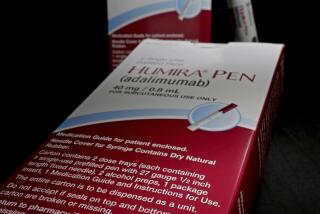AbbVie-Shire deal puts more pressure on Congress to overhaul tax code
- Share via
Reporting from washington — A massive pharmaceutical merger that will send the headquarters of a major U.S. drug maker overseas ramps up pressure on Congress to curtail the ability of companies to shelter foreign earnings.
Illinois drug maker AbbVie Inc. said Friday that it would buy European rival Shire for $55 billion and reincorporate in Britain. The move would enable AbbVie, maker of the arthritis drug Humira, to slash its overall tax rate.
The deal stands out as a major marker in the escalating debate in Washington about so-called inversions, in which an American multinational company buys a foreign competitor and restructures abroad to avoid paying the high U.S. corporate tax rate on offshore earnings.
“The thing is spiraling out of control,” said Rep. Sander M. Levin (D-Mich.), who is pushing legislation to make the tactic more difficult. “This development accelerates the attention of Congress.”
The issue will be a focus of a Senate Finance Committee hearing Tuesday on how to develop an internationally competitive tax code as lawmakers wrestle with an overhaul of business taxes.
The AbbVie/Shire deal is among the largest of about 50 inversions over the last decade. Late Tuesday, Treasury Secretary Jacob J. Lew urged Levin and other key congressional tax-writers to take quick action to restrict the tactic, which he called an abuse of the U.S. tax system.
The new drug company will reincorporate on the British island of Jersey, a well-known tax haven where Shire is incorporated.
AbbVie, based in North Chicago, said the move would cut its overall effective tax rate from 22.6% last year to 13% in 2016, according to a filing Friday with the Securities and Exchange Commission.
The U.S. corporate tax rate is 35%. Jersey has a 0% standard corporate tax rate.
AbbVie Chief Executive Richard Gonzalez said reducing the company’s tax rate wasn’t the only reason for purchasing Shire, known for Adderall, a leading drug to treat attention deficit hyperactivity disorder. The acquisition is an “excellent strategic fit,” he said.
“We wouldn’t be doing it just for the tax impact,” Gonzalez said on a conference call. “That’s an additional benefit that we have.”
The deal creates a pharmaceutical giant with 30,000 employees and a $137-billion market capitalization, the value of all issued shares. It also highlights how many companies, particularly drug makers and medical device makers, have turned to inversions to reduce their tax bills.
Earlier this week, another U.S. drug maker, Mylan Inc. of Canonsburg, Pa., agreed to buy Abbott Laboratories’ generic drug business in developed countries. The new company will be incorporated in the Netherlands, where the corporate tax rate is 25%.
The Obama administration and congressional leaders prefer to deal with inversions through a broad tax overhaul that would lower the U.S. corporate rate, which is the highest among major developed economies.
But those efforts have stalled amid disagreement over eliminating tax breaks and using some of the savings for more government spending. That has led some Democrats to push for stand-alone legislation that would make it more difficult for U.S. companies to restructure abroad.
Levin’s bill would generate an additional $19.5 billion in tax revenue over the next 10 years. It is similar to pending legislation in the Senate and a proposal in President Obama’s fiscal 2015 budget.
Companies that restructure overseas are trying to have all the benefits of being located in the U.S. without fully paying for them, Levin said. The maneuver is particularly egregious in the case of pharmaceutical companies such as AbbVie because the federal government pumps so much tax money into research at the National Institutes of Health, he said.
“The basic research in this country is done mainly with government funds,” Levin said. “NIH is the heart of basic science research that they benefit from.”
Business groups and some top Republicans argue that companies are turning to inversions to remain competitive because many countries have lowered their corporate tax rates in recent years, while the U.S. hasn’t.
“America’s business tax system has simply not kept up with the demands of today’s global marketplace,” said John Engler, president of the Business Roundtable trade group.
American corporations have an estimated $2 trillion in foreign earnings stashed abroad because they don’t want to pay the higher U.S. taxes on the money should they bring it home.
AbbVie CEO Gonzalez said lawmakers needed to reform the corporate tax code so companies could be more competitive in the global economy.
“Companies like ours need access to our global cash flows to be able to make investments all around the world, but to specifically be able to make investments in the United States,” he said.
“And today we’re at a disadvantage versus many of our foreign competitors,” he said. “That’s the important debate that we should be having around inversion and all aspects of the U.S. tax code.”
More to Read
Inside the business of entertainment
The Wide Shot brings you news, analysis and insights on everything from streaming wars to production — and what it all means for the future.
You may occasionally receive promotional content from the Los Angeles Times.











